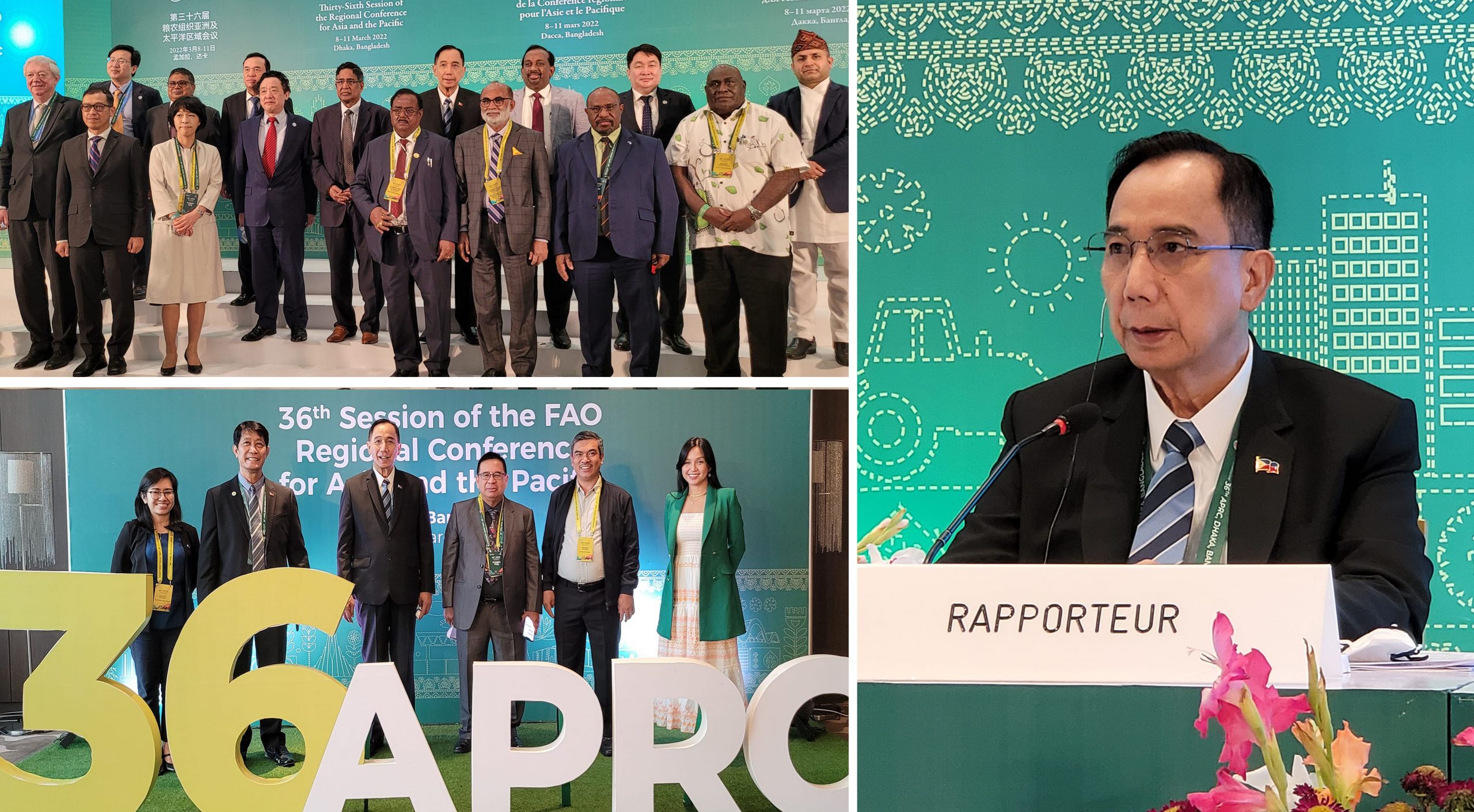
Dhaka, Bangladesh – Agriculture ministers in Asia and the Pacific have committed to vigorously promote the use of socio-technical innovations to improve food systems that would reduce hunger and malnutrition, and enhance food security in the region.
Such is one of several commitments and agreements forged on March 11 or the second day of the 36th Session of the Asia Pacific Regional Conference (APRC) of the Food and Agriculture Organization of the United Nations (FAO).
“There are vast potentials for digitalization and innovations in support of agri food system transformation, with emphasis on awareness and capacity-building of small farmers, fishers, women, and the youth,” said Philippine Agriculture Secretary William Dar, who was elected rapporteur of the ministerial session.
“The technologies leverage digital and agriculture precision tools aimed at improving resource use efficiency and climate resilience, which are critical to food systems development,” said Secretary Dar, as he reported the highlights of the proceedings.
The Asia-Pacific agriculture ministers, attending physically and virtually, said they are one way or the other into digitalization of their respective agrifood value chain, from production to consumption, that offers opportunities for improving the region’s food and nutrition security, livelihoods, and environmental sustainability.
Further, they agreed to scale-up digitalization in an inclusive and sustainable manner, amid the Covid-19 pandemic.
They also welcomed the continuing efforts of the FAO in supporting inclusive digitalization, and in increasing awareness of its benefits and challenges faced by small farmers, fishers, entrepreneurs, women, youth and indigenous peoples.
“Agri food systems remain as among the major economic drivers, promoting food and nutrition security. It is high time that Asia-Pacific countries speed up the adoption and scaling up of agriculture technologies and innovations for continued economic growth,” Secretary Dar reported.
Stressing that there is no “one-size-fits-all” solution, the agriculture ministers called for an urgent need to increase investments in rural infrastructure, financial services, technological innovations, digital technologies, education and training (including financial and digital literacy), and access to social protection.
They also agreed on adopting the “One Health” (OH) multisectoral and transdisciplinary approach that is key in preserving animal, human, and environmental health.
They highlighted the crucial role of effective biosecurity systems in addressing the emergence of pest and diseases, and promoting “One Health” policy, to which they recommended the following measures:
- Improve food safety systems
- Develop effective health standards
- Improve access to livestock vaccines
- Strengthen OH capacity development
- Enhance and institutionalize collaboration with tripartite partners: World Health Organization (WHO), FAO, and World Organization for Animal Health (OIE).
For his part, FAO Director-General Qu Dongyu said they will continue to support and deepen collaboration with international and regional institutions in the implementation and monitoring of food security frameworks, natural resource management, and food systems-related policies and regulations.
“The key to a food-secure economy lies on strong food systems. Thus, we should come up with inclusive policies to transform our respective agriculture, fishery, environment and natural resources sectors. Such efforts must and always begin with innovation. Innovation invites investments, and investments enrich economies,” concluded Secretary Dar.
Hosted by Bangladesh, the 36th FAO APRC was attended by agriculture ministers and senior officials from 42 member-states and 76 non-member nations, and governmental and non-governmental organizations. The four-day conference commenced with the Senior Officers Meeting (SOM), on March 8 to 9, and capped by the Ministerial Session, on March 10 to 11.
Secretary Dar led the Philippine delegation, composed of: DA Undersecretary for Policy and Planning Dr. Fermin Adriano; DA Spokesperson and Assistant Secretary (A/Sec) for Strategic Communications Noel Reyes; A/Sec for Planning and Project Development Agnes Catherine Miranda; DA-Bureau of Agricultural Research Director Junel Soriano; Executive Assistant Frances Mae Ramos; and Philippine Ambassador to Bangladesh Alan Deniega. ### (Noel O. Reyes and Daryl Battad, DA StratComms)













